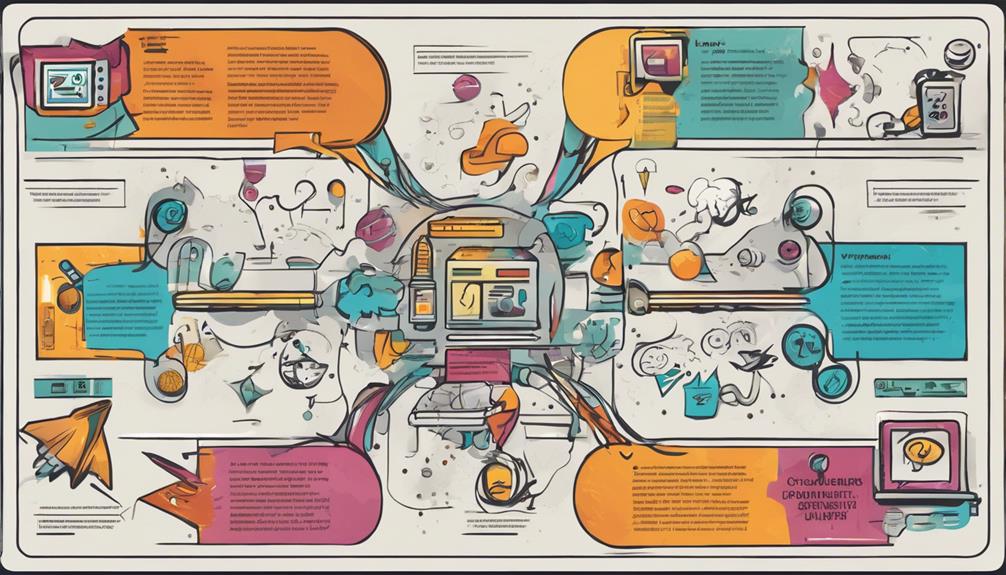Revealing success through product development means turning your creative ideas into market-ready solutions. You require a strategic approach that encompasses every aspect from idea generation to marketing. It is crucial to ensure your products align with customer needs and market demands. Continuously evaluate your product offerings to detect any early signs of decline. Safeguard your intellectual property to maintain a competitive advantage. Enhance success rates by refining your designs through research and development. Lastly, effective marketing will help you connect with your target audience. There is still much more to discover about the key factors that contribute to successful product development; therefore, continue exploring to uncover additional insights.
Key Takeaways
- Effective product development aligns innovative ideas with customer needs, driving market relevance and growth.
- Regular assessment of product performance helps identify declining lines and improve market positioning.
- A robust R&D strategy refines designs and prototypes, increasing the likelihood of successful market entry.
- Strategic marketing and promotion enhance product visibility and attract target audiences through various channels.
Understanding Product Development

Product development is the strategic process that transforms innovative ideas into market-ready products, driving growth and ensuring a company's relevance in a competitive landscape.
You'll find that successful product development involves several significant steps, including strategy formulation, concept generation, marketing plan creation, and thorough evaluation. Each stage is essential to align new products with customer needs and market demands.
As you initiate this journey, consider historical examples, like AT&T, which thrived by consistently evolving its product line.
Identifying Declining Product Lines

Recognizing the signs of declining product lines is essential for maintaining market relevance and ensuring your company can adapt to changing customer needs.
You should regularly assess your product performance to identify potential issues before they escalate.
Look out for these key symptoms:
- Slow or stagnant revenue growth
- Increased price competition from rivals
- Decreased business from top customers
Stages of New Product Development

The new product development process consists of five essential stages: idea generation, evaluation, protection, design, and marketing.
First, you'll brainstorm innovative concepts, drawing inspiration from customer feedback or market trends.
Next, evaluate these ideas critically, using expert opinions to filter out the viable options.
After that, focus on protecting your ideas through patents or trade secrets to secure your competitive edge.
Then, move to the design phase, where you'll refine your product based on usability and functionality.
Finally, in the marketing stage, create a compelling strategy to educate potential customers and promote your product effectively.
Protecting Intellectual Property

Effective protection of intellectual property safeguards your innovative ideas and gives you a competitive advantage in the marketplace. By taking the right steps, you guarantee your hard work isn't easily copied or exploited.
Here are some essential actions you should consider:
- File for patents to secure exclusive rights to your inventions.
- Utilize trademarks to protect your brand identity and logos.
- Implement non-disclosure agreements (NDAs) with employees and partners to maintain confidentiality.
Role of Research and Development

Research and development (R&D) plays an essential role in transforming innovative ideas into market-ready products, ensuring they meet customer needs and stand out in a competitive landscape.
By investing in R&D, you refine designs and develop prototypes, allowing you to test usability and gather feedback before launch. This iterative process helps you identify potential flaws and areas for improvement.
R&D also aids in market testing and cost analysis, ensuring your product aligns with market demands. Without strong R&D efforts, you risk launching products that don't resonate with customers or fail to differentiate from competitors.
Ultimately, a robust R&D strategy enhances the likelihood of product success and drives your business forward in a rapidly changing market.
Marketing and Promotion Strategies

Successful product development doesn't stop at R&D; it requires strategic marketing and promotion to guarantee your innovative offerings reach the right audience and achieve market traction.
To effectively promote your product, you need to focus on creating awareness and driving engagement. Here are some key strategies to contemplate:
- Leverage social media to create buzz and connect with your audience.
- Utilize influencer partnerships to enhance credibility and reach.
- Implement targeted advertising to assure your message lands with the right demographics.
Operational Considerations for Products

Consider how operational efficiencies can considerably impact the success of your product in the market. By streamlining processes, you can reduce costs and enhance product quality, giving you a competitive edge. Focus on three key operational aspects: production, distribution, and customer service.
| Aspect | Importance | Strategy |
|---|---|---|
| Production | Reduces costs and waste | Implement lean manufacturing |
| Distribution | Guarantees timely delivery | Optimize logistics channels |
| Customer Service | Builds loyalty and satisfaction | Invest in training and support |
Financial Management in Development

Effective financial management plays an essential role in ensuring your product development stays on track and within budget.
You need to monitor expenses, forecast future costs, and allocate resources wisely. This approach not only minimizes risks but also maximizes the potential for success.
Here are some key aspects to focus on:
- Set a realistic budget that reflects all stages of development.
- Regularly review financial reports to track progress and identify discrepancies.
- Utilize financial modeling to predict the impact of various scenarios.
How Does Product Pricing Impact the Success of Product Development?
Mastering product pricing strategies is crucial for the success of product development. The price of a product can directly impact consumer perception, market positioning, and ultimately, sales. By implementing effective pricing strategies, businesses can maximize their profits and gain a competitive edge in the market.
Conclusion
In the ever-evolving landscape of product development, you hold the key to releasing your success.
By nurturing innovative ideas and staying attuned to customer needs, you can breathe new life into your offerings. Picture your products as seeds, waiting to blossom in the market's fertile soil.
Embrace research, protect your innovations, and wield strategic marketing like sunlight.
As you cultivate these elements, you'll not only thrive but create a garden of growth that stands tall against the competition.









